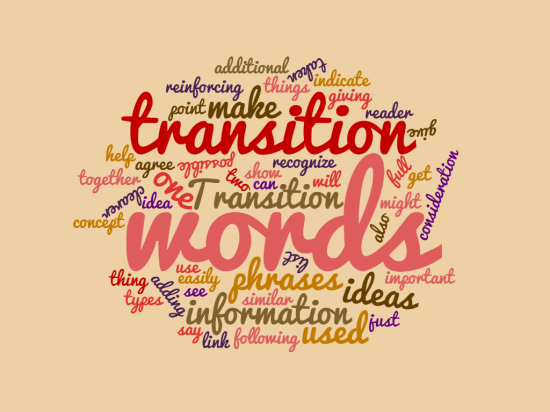What Are Transition Words?

Let’s get into the different types of transition words to make the concept clearer. This won’t give you the full list of transition words, but will make it possible to easily recognize them. These words can be used to show two things agree with each other, are similar to each other, or you’re giving additional information.
When you are adding information or reinforcing an idea you might use one of the following transition words:
- Also
- In addition
- Likewise
- In the first place
- Not only (an additional ‘also’ comes into the sentence when you use this one)
- Not to mention
- By the same token
- Coupled with
- In the light of
- Equally
Some of these are also short, basic words such as:
- And
- To
- Again
- Also
- Like
- Then
Transition words can be used to point out a contradiction, a limitation or an opposing point of view:
- Rather than
- Although this may be true
- On the contrary
- In contrast
- Despite
- In reality
- Then again
- Even though
- On the other hand
- At the same time
- But
- Rather
- Or
- Yet
- While
- Albeit
- Notwithstanding
When you are trying to link cause and effect, write about something that is conditional or express an intention, you may also use transitional words:
- In the event of (or that)
- For the purpose of
- Inasmuch as
- For fear that
- As long as
- Granted that
- With this in mind
- In order to
- In view of
- Because of
- With this intention
- If
- Unless
- While
- When
- Whenever
Another time you’d use these words is when you want to give an example, support a point or emphasize it:
- Especially
- In other words
- For one thing
- For this reason
- That is to say
- In this case
- Must be remembered
- For example
- Notably
- Like
- Truly
- Chiefly
- Expressly
- Significantly
- In fact
We also use transitional words to show that something has a consequence or result:
- Accordingly
- In that case
- As a result
- Thus
- Consequently
- Under these circumstances
- Hence
- Therefore
- Henceforth
- Forthwith
We use them to make conclusions too:
- Generally speaking
- All things considered
- In the long run
- As shown
- In conclusion
- In a word
- As has been noted
- Given that
- After all
- In short
- By and large
- In any event
- All in all
- Obviously
- Definitely
- Ultimately
…and to define a time period
- At the present time
- Presently
- From time to time
- Sooner or later
- At the same time
- Simultaneously
- To begin with
- Meanwhile
- Eventually
- Finally
- Last
- Until
- Before
- Whenever
- Next
- Now
Lastly (did you spot the transition word there?), transition words can indicate a place or space:
- In the middle
- Central to
- In the center of
- Adjacent to
- Opposite to
- In front of
- Near
- Below
- Under
- Down
- Up
- Beyond
- Amid
- Across
- Alongside
It’s important to note that none of these words and phrases are actually wrong, I’m inclined to think that using simple, straightforward language is best. This means that you often don’t need to use many of the transition words listed above.
For example, I’m guilty of using “in addition,” but I could just as easily say “also” or even “and.” As for “albeit” and “notwithstanding,” I’m inclined to think that “but” and “nevertheless” are every bit as good and much more accessible to a reader. “For the purpose of” is also one I’ll admit to using, but it can easily be reduced to three letters. I prefer “for” and it will do the job just as well most of the time. As for “At the present time,” the word “now” is really all we need. “In the event of” is similar. It can be replaced with the two letter word “if.”
You’ll usually only use the wordier of these transition phrases in academic writing, and they can be helpful. After all, although your choice of transition words may not necessarily impress your teacher, you can use the longer phrases to stretch your word count. Remember, every time you write “in the event of” instead of “if” that’s three words towards your target word count instead of one. “For the purpose of” could just be “for,” but then you only get one word instead of four. Transition words are handy, and everyone uses them a lot, but be careful about using excessively wordy ones unnecessarily.


I try to avoid transition works except where absolutely necessary. They add words not truly needed. If I see writing with a lot of transition words, I consider it poor quality.
I don’t see what’s wrong with them. They are part of the English language. There’s nothing wrong with using them. it seems awfully judgemental of you to consider writing poor quality just because someone uses transition words.
So, I’m not sure if I get this whole transition word thing. Like, is this the thing that people do often? In my humble opinion, this may be more difficult than most people think. On the other hand, I might be a lot better at it than I thought I was.
Indeed, I see what you have done there. While I may not agree with everything you have said, I still see the point you’re trying to get across. That is, transition words can be used in many different ways, You see, I can do it just as well as you can